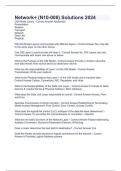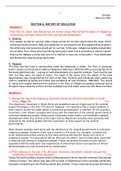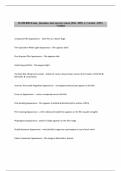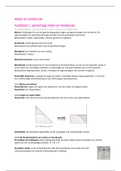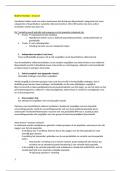😃
Simmonds - Central issues
jurisp.
austin bentham hart judicial decisions jurisprudence
Column
legal positivism positivists rule of recognition
Tags p. 7 - 12 Reader
Legal Positivism
Jurisprudence : long running battle between 2 camps :
Legal positivists and natural lawyers
Debate about legal positivism has occupied a central place in
jusrisprudential debate for a long time
Hart : Principal modern exponent of legal positivism
Blackstone : law as enforcing natural rights
Bentham : law should be criticised and evaluated by reference to the
principle of utilitarity and not by reference to a misguided belief in the
existence of natural law or natural rights
Simmonds - Central issues jurisp. 1
, Tendency to treat law making authority as a matter of moral or
political legitimacy, appealing to a version of social contract theory of
the legislator to enact laws
Bentham and Austin → provide firm foundation for the seperation of
expository and censorial jurisprudence by their general theories of law
Sovereignty was treated as a metter of social fact
Hart was profoundly critical of the legal theories from Bentham and Austin
But ! he shared with them a general aspiration to contruct a positivist
theory of law that distinguishes clearly between law and morals
The central claim of legal positivism is that is law seperate and distinct
from morality
1. Positivists claim that we work out what the existing law is without
making any moral judgements. A rule is a valid legal rule whether it is
good or bad, just or unjust
2. Positivists claim that propositions of law, in which we state the
exitence osthrogoths legal rights and duties, are not moral judgements.
Two different senses of the words "rights" and "duties". Law cannot
confer moral rights and impose moral duties.
Important points !
1. Positivists do not necessarily deny the importance of morality.
Bentham was centrally concerned with the moral criticism of law with a
view to its reform
2. Positivists do not deny that morality influences the content of law. A
rule does not become law until it has been laid down in a source such
as a statute ot a decided case
3. Positivits do not deny that judges sometimes decide cases by
reference to moral values, or considerations of moral policy. They do
deny that judges have to make moral judgements in working out what
the existing law is. Since pre exiting law does not give an answer, they
need to fo into extra legal considerations, they will then establish a
new legal rule
4. Positivists do not deny that there may be a motal obligation to obey
the law. The question of what the law is and whether it ought to be
Simmonds - Central issues jurisp. 2
, obeyed are two differnet questions. Bentham and Hart argue that our
moral reflections on the scope of the obligation to obey the law are
clarified by adopting a positivist conception of law
Rules and the internal point of view
Postitivits see the legal order as a body of rules which have been "posited"
or laid down by persons with law making authority
Positivits think that the question of what the law is and the question of
whether or not it ought to be obeyed are two different questions
Positivits must offer accounts of what is it to have a "legal obligation" or a
"legal right"
Bentham & Austin : treated statements about sovereignty, rights and
obligations, as straightforward statement of observable social facts
Legal concept is treated as referring to observable social facts
Sovereignty : Regular patterns of obedience
Obligation : likelihood of suffering a sanction
Hart thinks we can't seperate law and morals by simply reducing
porpositions of law to straightforward factual descriptions of regular
patterns of behavior
Austin : obligations exist insofar as the failure to obey the sovereign's
orders is regularly followed by the application of sanction
When a judge refers to a defendant obligation as a reason
Hart : where an accepted rule exits, the regular pattern of conforming
behavior ("external aspect") is accompanied by an "internal aspect"
Where a rule exists people who do not conform to the regular pattern are
citicised and the criticism is regarded as justified
People regard the rule from an "internal" point of view, treating it as a
reason for acting
"ought" to be done; treat the rule as imposing "obligations"
Appropraite basis for the evaluation and criticism of conduct
Hart uses these basic ideas to explain the nature of law making authority
Simmonds - Central issues jurisp. 3
Simmonds - Central issues
jurisp.
austin bentham hart judicial decisions jurisprudence
Column
legal positivism positivists rule of recognition
Tags p. 7 - 12 Reader
Legal Positivism
Jurisprudence : long running battle between 2 camps :
Legal positivists and natural lawyers
Debate about legal positivism has occupied a central place in
jusrisprudential debate for a long time
Hart : Principal modern exponent of legal positivism
Blackstone : law as enforcing natural rights
Bentham : law should be criticised and evaluated by reference to the
principle of utilitarity and not by reference to a misguided belief in the
existence of natural law or natural rights
Simmonds - Central issues jurisp. 1
, Tendency to treat law making authority as a matter of moral or
political legitimacy, appealing to a version of social contract theory of
the legislator to enact laws
Bentham and Austin → provide firm foundation for the seperation of
expository and censorial jurisprudence by their general theories of law
Sovereignty was treated as a metter of social fact
Hart was profoundly critical of the legal theories from Bentham and Austin
But ! he shared with them a general aspiration to contruct a positivist
theory of law that distinguishes clearly between law and morals
The central claim of legal positivism is that is law seperate and distinct
from morality
1. Positivists claim that we work out what the existing law is without
making any moral judgements. A rule is a valid legal rule whether it is
good or bad, just or unjust
2. Positivists claim that propositions of law, in which we state the
exitence osthrogoths legal rights and duties, are not moral judgements.
Two different senses of the words "rights" and "duties". Law cannot
confer moral rights and impose moral duties.
Important points !
1. Positivists do not necessarily deny the importance of morality.
Bentham was centrally concerned with the moral criticism of law with a
view to its reform
2. Positivists do not deny that morality influences the content of law. A
rule does not become law until it has been laid down in a source such
as a statute ot a decided case
3. Positivits do not deny that judges sometimes decide cases by
reference to moral values, or considerations of moral policy. They do
deny that judges have to make moral judgements in working out what
the existing law is. Since pre exiting law does not give an answer, they
need to fo into extra legal considerations, they will then establish a
new legal rule
4. Positivists do not deny that there may be a motal obligation to obey
the law. The question of what the law is and whether it ought to be
Simmonds - Central issues jurisp. 2
, obeyed are two differnet questions. Bentham and Hart argue that our
moral reflections on the scope of the obligation to obey the law are
clarified by adopting a positivist conception of law
Rules and the internal point of view
Postitivits see the legal order as a body of rules which have been "posited"
or laid down by persons with law making authority
Positivits think that the question of what the law is and the question of
whether or not it ought to be obeyed are two different questions
Positivits must offer accounts of what is it to have a "legal obligation" or a
"legal right"
Bentham & Austin : treated statements about sovereignty, rights and
obligations, as straightforward statement of observable social facts
Legal concept is treated as referring to observable social facts
Sovereignty : Regular patterns of obedience
Obligation : likelihood of suffering a sanction
Hart thinks we can't seperate law and morals by simply reducing
porpositions of law to straightforward factual descriptions of regular
patterns of behavior
Austin : obligations exist insofar as the failure to obey the sovereign's
orders is regularly followed by the application of sanction
When a judge refers to a defendant obligation as a reason
Hart : where an accepted rule exits, the regular pattern of conforming
behavior ("external aspect") is accompanied by an "internal aspect"
Where a rule exists people who do not conform to the regular pattern are
citicised and the criticism is regarded as justified
People regard the rule from an "internal" point of view, treating it as a
reason for acting
"ought" to be done; treat the rule as imposing "obligations"
Appropraite basis for the evaluation and criticism of conduct
Hart uses these basic ideas to explain the nature of law making authority
Simmonds - Central issues jurisp. 3


